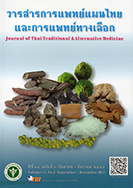Traditional Thai Medicine Formula "Benja Amarit" in Liver Cancer Patiens: Safety and Quality of Life
Main Article Content
Abstract
In 2009, liver cancer and cholangiocarcinoma is the major cause of death among cancer patients in Thailand. Nowadays, the traditional Thai medicine formulary “Benja Amarit” has been prescribed in combine with the standard treatment for palliative care in patients with liver cancer in some public hospitals. The aim of this study was to report the safety and preliminary effect of Benja Amarit recipe in the treatment of liver cancer. This prospective descriptive study was designed to assess the safety and effect of Benja Amarit recipe in patients who have been diagnosed as having liver cancer with clinical evaluations, i.e. CT imaging along with serum AFP or liver biopsy in 5 public hospitals. Baseline characteristics and blood examinations, adverse event using Thai algorithm and quality of life using Thai Modified Function Living Index Cancer Questionnaire Version 2 (T-FLIC 2) were evaluated and reported for 6 months. The survival rate was also observed within 1 year. Ninety-six cases of liver cancer patients with the mean age of 56.36±10.50 years were included. The ECOG Scale of performance status showed that patients were in between fully active and restricting in physically strenuous activity but ambulatory and able to carry out work of a light or sedentary nature. Additionally, the mean serum alpha-fetoprotein was at 92.98+181.91 confirmed the abnormality of the liver function. The capsule of Benja Amarit recipe (300 mg/capsule) was prescribed by Thai traditional medicine practitioner at the dose of 1 - 4 capsules per time twice a day in the morning and evening. Reports revealed that 53.12% of patients were prescribed the regimen containing Benja Amarit recipe and other traditional Thai medicine formulae. Quality of life score using T-FLIC 2 tended to increase every month. However, the results showed that the T-FLIC 2 scores were significantly increased after Benja Amarit recipe has been taken continuously for 2 months (p < 0.05). During 1-year follow-up, the survival rate was at 27.08%. None of serious adverse event was reported. This study reveals that Benja Amarit recipe is safe as well as tends to benefit for patients with liver cancer. However, further clinical trials should be conducted to confirm the effectiveness of this traditional Thai formula.
Article Details
References
2. National Cancer Institute, Department of Medical Services, Ministry of Public Health. Guidelines for the screening, surveillance, and diagnosis of hepatocellular carcinoma and cholangiocarcinoma. Bangkok: Khosita Publishing; 2016. 155 p. (in Thai)
3. Department of Health Service Support, Office of the Permanent Secretary, Ministry of Public Health. General Traditional Medicine Volume 2. Bangkok: M.P.P.; 1997. (in Thai)
4. Phraya Phitsanuprasatvej. Phaetsart Songkroh Volume 1. Bangkok: Supakarnjaroon; 1908. (in Thai)
5. Ayurvada College (Komarapat). Phaetsart Songkroh Volume: conserve. Bangkok: Chulalongorn University Publishing; 1992. 311 p. (in Thai)
6. Thai Traditional Medicine Research Institute. Cytotoxicity and anti-oxidation activity of Thai herbs in Benja Amarit formulary. Bangkok: Department of Thai Traditional and Alternative Medicine, Ministry of Public Health; 2011. (in Thai)
7. Thai Traditional Medicine Research Institute. Toxicity of Thai herbal recipe: Benja Amarit. Bangkok: Department of Thai Traditional and Alternative Medicine, Ministry of Public Health; 2012. (in Thai)
8. Thai Traditional Medicine Research Institute. Reporting of Benja Amarit treatment in Thai traditional and complementary hospital. Bangkok: Department of Thai Traditional and Alternative Medicine, Ministry of Public Health; 2014. (in Thai)
9. Panyaphu D, Worakunphanich W, Teerachaisakul M, Stienrut P, Nootim P, Banchuen K, et al. Quality control of herbals, Cytotoxicity, Toxicity and Monitoring of Benja Amarit treatment in hepatocellular carcionoma patient. Thailand Research Symposium 2016 Proceeding. 2016;1:228-36.
10. Food and Drug Administration, Ministry of Public Health. Manual of Thai Algorithm for evaluation of adverse drug reaction. Bangkok: aksorn graphic and design publishing; 2007. p. 6. (in Thai)
11. Naranjo’s algorithm. [Internet]. 2011 [cited 2011 Nov 22]; Available from: http://part.sopmoei.com/pharm/files/Naranjo.pdf.
12. Schipper H, Levitt M. Measuring quality of life: Risks and benefits. Cancer treatment reports. 1985;69(10):1115-23.
13. Thongprasert S, Intarapak S, Saengsawang P, Thaikla K. Reliability of the Thai-modified function living index cancer questionnaire version 2 (T-FLIC 2) for the evaluation of quality of life in non-small cell lung cancer patients. J Med Assoc Thai. 2005;88(12): 1809-15.
14. Bosch FX, Ribes J, Cleries R, Diaz M. Epidemiology of hepatocellular carcinoma. Clin Liver Dis. 2005;9:191-211.
15. Cabibbo G, Enea M,Attanasio M, Bruix J, Craxì A, Cammà C. A meta-analysis of survival rates of untreated patients in randomized clinical trials of hepatocellular carcinoma. Hepatology. 2010;51(4):1274-83.
16. Wu P, Jean D, Oghenowede E, Edward J M. Traditional Chinese Medicines in the Treatment of Hepatocellular Cancers: A Systematic Review and Meta-Analysis. Journal of Experimental & Clinical Cancer Research. 2009;28(1):112.

